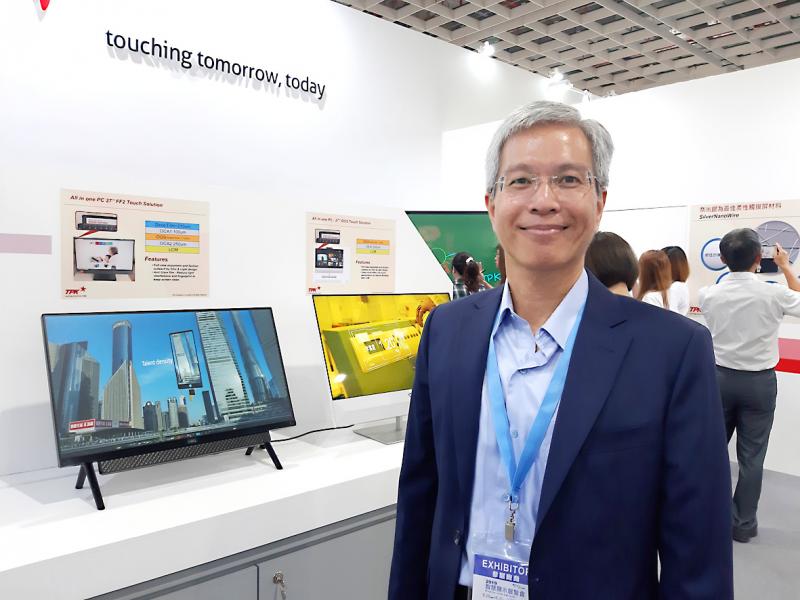TPK Holding Co (宸鴻) last quarter swung back to profit from a loss in the previous quarter as remote learning and work-from-home practices boosted shipments of touch products for tablets and notebook computers in the slow season, the company said yesterday.
Net profit last quarter reached NT$40 million (US$1.34 million), compared with a loss of NT$98 million in the final quarter of last year, the firm said.
Last quarter’s profit nearly doubled from NT$24 million a year earlier, it added.

Photo: CNA
The supplier of touch sensors and modules attributed the results to “surprising” growth in shipments of laptops and tablets as more employees and students worldwide remain home for telecommuting and remote learning amid the COVID-19 pandemic.
Shipments of touch sensors and modules for tablets and laptops last quarter expanded 10 percent quarterly, boosting their revenue contribution to 41 percent of total revenue, compared with 34 percent in the preceding quarter, the company said.
“The first quarter was better than we had estimated. The second quarter will be a slow season, as customers start to replenish inventory in preparation for peak demand in the second half,” TPK chief strategic officer Freddie Liu (劉詩亮) told a teleconference.
However, Liu said that the firm’s revenue decline this quarter would be slower than previous second quarters, with revenue falling 5 to 10 percent from NT$28.19 billion in the first quarter, he said.
TPK said that it would also retain its operating margin above a break-even level this quarter, similar to last quarter’s 0.4 percent.
“We continue to see strong demand from large tablets and notebook [computers] in the second quarter, aided by remote schooling and telecommuting,” TPK chief executive officer Leo Hsieh (謝立群) said.
However, the company expects demand from the smartphone segment to dwindle this quarter, extending weakness that began late last quarter, Hsieh said.
Shipments of touch products for smartphones last quarter shrank 29 percent quarter-on-quarter due to weak demand and supply chain disruptions, TPK said.
Touch sensors and modules for smartphones last quarter accounted for 42 percent of the firm’s revenue, down from 47 percent in the prior quarter, it said.
Despite offering an above-seasonal pattern forecast for this quarter, TPK is cautiously optimistic about the second half, given uncertainty about when the pandemic would be brought under control, and whether the government’s stimulus and relief measures would prop up economic growth, Hsieh said.
On a positive note, one customer still plans to roll out two foldable smartphones in the second half using TPK’s new silver-nanowire touch technology, he said.

In Italy’s storied gold-making hubs, jewelers are reworking their designs to trim gold content as they race to blunt the effect of record prices and appeal to shoppers watching their budgets. Gold prices hit a record high on Thursday, surging near US$5,600 an ounce, more than double a year ago as geopolitical concerns and jitters over trade pushed investors toward the safe-haven asset. The rally is putting undue pressure on small artisans as they face mounting demands from customers, including international brands, to produce cheaper items, from signature pieces to wedding rings, according to interviews with four independent jewelers in Italy’s main

Japanese Prime Minister Sanae Takaichi has talked up the benefits of a weaker yen in a campaign speech, adopting a tone at odds with her finance ministry, which has refused to rule out any options to counter excessive foreign exchange volatility. Takaichi later softened her stance, saying she did not have a preference for the yen’s direction. “People say the weak yen is bad right now, but for export industries, it’s a major opportunity,” Takaichi said on Saturday at a rally for Liberal Democratic Party candidate Daishiro Yamagiwa in Kanagawa Prefecture ahead of a snap election on Sunday. “Whether it’s selling food or

CONCERNS: Tech companies investing in AI businesses that purchase their products have raised questions among investors that they are artificially propping up demand Nvidia Corp chief executive officer Jensen Huang (黃仁勳) on Saturday said that the company would be participating in OpenAI’s latest funding round, describing it as potentially “the largest investment we’ve ever made.” “We will invest a great deal of money,” Huang told reporters while visiting Taipei. “I believe in OpenAI. The work that they do is incredible. They’re one of the most consequential companies of our time.” Huang did not say exactly how much Nvidia might contribute, but described the investment as “huge.” “Let Sam announce how much he’s going to raise — it’s for him to decide,” Huang said, referring to OpenAI

Nvidia Corp’s negotiations to invest as much as US$100 billion in OpenAI have broken down, the Wall Street Journal (WSJ) reported, exposing a potential rift between two of the most powerful companies in the artificial intelligence (AI) industry. The discussions stalled after some inside Nvidia expressed concerns about the transaction, the WSJ reported, citing unidentified people familiar with the deliberations. OpenAI makes the popular chatbot ChatGPT, while Nvidia dominates the market for AI processors that help develop such software. The companies announced the agreement in September last year, saying at the time that they had signed a letter of intent for a strategic